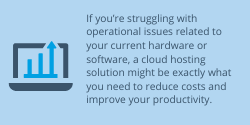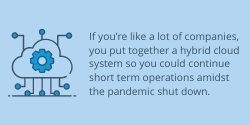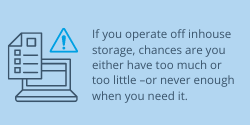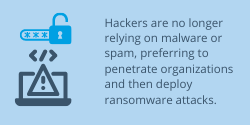3 Problems You Can Solve by Using Cloud Based Services in Your Business
When the pandemic hit, you may have cobbled together a solution to allow for work from home. Now that business is moving back to the office, you may realize that there are permanent changes to the workplace – both where it happens and employee expectations around it.
Or you’re being crushed by escalating onsite storage costs that don’t scale to match demand.
Or you may be up nights worrying what a data breach could mean to your company’s reputation and financials.
If you’re struggling with operational issues related to your current hardware or software, a cloud hosting solution might be exactly what you need to reduce costs and improve your productivity.
1. You’re facing a challenge hiring qualified, quality candidates.
As of March 2022, nearly 50% of corporate employers reported wanting employees back in the office 5 days a week. And you may be in that number as well. After all, you’re in good company if you believe that WFH or even hybrid work doesn’t fit into your long-term goals for company culture.
But the trouble is, the Great Resignation has shifted employee loyalty in a big way. Without continuation of the workplace flexibility your key employees enjoyed during the pandemic, you may risk losing them or finding yourself to be less competitive when it comes to hiring for open positions at your business.
 If you’re like a lot of companies, you put together a hybrid cloud system so you could continue short term operations amidst the pandemic shut down.
If you’re like a lot of companies, you put together a hybrid cloud system so you could continue short term operations amidst the pandemic shut down.
You probably also figured that eventually you’d be able to return to the office and go back to using your legacy applications from individual workstations – just as you always have.
Think through what you want to accomplish if you’re set on returning to the office. But if you want to have increased flexibility and productivity, consider moving your workflows, data storage, and processing to a virtual desktop.
You retain the familiarity and function of your existing programs while having the increased efficiency and data security afforded by the cloud. Plus, this option reduces overhead to maintain onsite servers and keeps your company in a position to hire and retain the best people to keep your business running.
2. You’re maintaining costly in-house storage but your actual storage demands are quite variable.
It’s tax season, and you suddenly have client receipts and files flooding in. Or, your senior partner lands a huge corporate lawsuit that has ramped up e-discovery demands.
 If you operate off inhouse storage, chances are you either have too much or too little –or never enough when you need it. And regardless, that costs you. You either have to purchase more hardware or processing speeds and client satisfaction suffer.
If you operate off inhouse storage, chances are you either have too much or too little –or never enough when you need it. And regardless, that costs you. You either have to purchase more hardware or processing speeds and client satisfaction suffer.
During off seasons or when demand slows, you’re still paying for the hardware and the monitoring and maintenance required to keep it ready when you need it again.
If you shift your data storage needs to a lightning fast and secure offsite data center, you can scale your storage needs on demand to match your actual demand. No more purchasing and maintaining servers you only need during peak times.
With a cloud storage partner, you can protect your data as it moves to and from your network – regardless of the endpoints. Staff working from home will be operating inside the same security environment with the same level of efficiency and security as employees in the office.
By shifting key IT costs to a third party cloud provider you reduce your total cost of ownership while improving your productivity. You get all the benefits of flexible storage plus you move the expense of upgrading the network off your operations budget.
3. You deal with a lot of sensitive customer data and keeping it all secure feels overwhelming.
In the last quarter of 2021, a cyber security company conducted a study that revealed small businesses are three times more likely than their larger counterparts to be hit by a cyber attack.
And it isn’t just any account that these hackers are after: they typically target the C-suite or the “boss” as an entry point and to gather the necessary information to launch a full-scale attack at a later date.
 These “social engineering” attacks reportedly were able to take down at least one account per organization in 2021. Hackers are no longer relying on malware or spam, preferring to penetrate organizations and then deploy ransomware attacks.
These “social engineering” attacks reportedly were able to take down at least one account per organization in 2021. Hackers are no longer relying on malware or spam, preferring to penetrate organizations and then deploy ransomware attacks.
Small businesses tend to have weak points in their security protocols that bad actors can easily exploit.
A good cloud partner will have a strong security position. CyberlinkASP has a 24/7 security center that monitors all aspects of your data transmission and identifies anomalies before they become problems.
And, if an attack happens, they deploy fast-acting rapid solutions to stop the attack and protect data. When interviewing a cloud services provider, be sure to ask them exactly what protocols and defenses they have in place to defend your data and keep your information secure.
If you’re ready to consider cloud-based solutions for your biggest business challenges, we’re ready to help.

